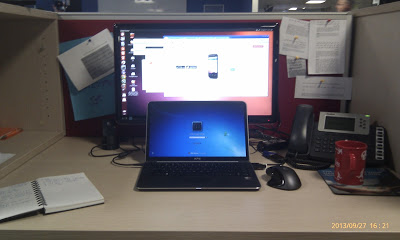Flask on AWS Serverless: A learning journey - Part 2
About 3 years ago I learnt some basic Python, which I've used almost exclusively to
Original post from September 2013
My previous post spoke about using Synergy as a software-based KVM. But to really see how useful it is, lets see how it fits into the bigger picture. This is my desktop at the moment:

MacBook Pro 13" (Previously HP XPS 13'' laptop - Windows 7)
HP Pro Desktop PC - Ubuntu 14.04
Samsung 21.5'' LED monitor
Logitech MX mouse
Both the laptop and the desktop are connected to the big screen - one via VGA, the other via DVI. I use the one mouse and keyboard to control both environments, using Synergy. Most of the time, Ubuntu is on the big screen. However, if I need to use the big screen for Windows as an extended desktop, I can quickly switch the screen from the VGA to the DVI input.
I keep files in sync between Windows and Linux using Unison. This is a two way sync, allowing both the environments to see my latest file changes. Between the MacBook Pro and Linux I use BitTorrent Sync, which is a private Dropbox replacement. I also setup TimeMachine on the MBP to backup to an external HDD plugged into Linux.
This is pretty much an almost exact copy of the desktop setup I used about 4 years ago. I dont know how long I will be using this setup though - I might soon switch to using a Mac. Maybe one day when I grow up, perhaps I can get a 27'' iMac, which one of the guys here uses.
Update 2017: For the last 2.5 years, my current setup is as follows:
So with the Hackintosh, I basically built my own iMac with a large screen.
I pay for 100GB Google Drive to sync files between the MBP and Hackintosh, and native Screen Sharing to control the Hackintosh on a separate window